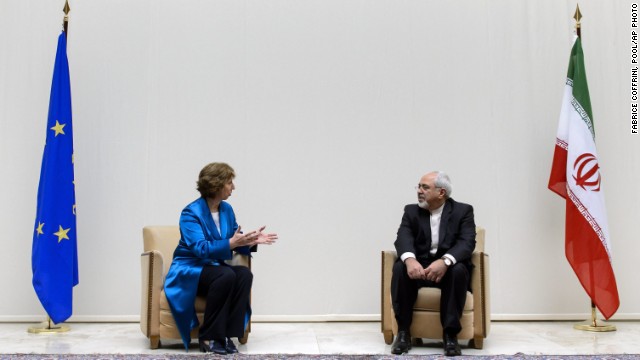
EU’s Catherine Ashton talks to Iran’s Mohammad Javad Zarif prior to the start of nuclear talks Tuesday, October 15 in Geneva.
STORY HIGHLIGHTS
- NEW: Six world powers enter into talks with Iran with “cautious optimism,” EU spokesman says
- Iran’s Foreign Minister says he hopes a “roadmap” will emerge from the talks
- Israel warns against easing the pressure of sanctions on Iran too soon
- Many in the West fear Iran seeks nuclear weapons; Iran says its intentions are peaceful
Geneva, Switzerland (CNN) — Iran’s negotiators are sitting down Tuesday in Geneva with six world powers for talks aimed at curbing its nuclear ambitions, amid a spirit of new optimism since President Hassan Rouhani took office this summer.
Ahead of the meeting, Iranian Foreign Minister Javad Zarif said he hoped that together Iran and the West would be able to work out a “roadmap” toward a final resolution by Wednesday.
Ahead of the talks: U.S. hopeful but ‘clear-eyed’
The two-day talks in Geneva, Switzerland, bring together Iran’s representatives with those from the so-called P5+1 — the United States, Russia, China, France and Britain, all countries with permanent seats on the U.N. Security Council, plus Germany.
EU foreign policy chief Catherine Ashton is chairing the talks for the P5+1 bloc, while Zarif is leading the Iranian delegation.
Ashton’s spokesman, Michael Mann, said the mood was one of “cautious optimism” but that the bloc would need to see the Iranian side engage constructively with its concerns.
The Iranian side presented its proposals Tuesday morning, which the six world powers will consider, Mann said. The P5+1 bloc put forward its own proposals at a meeting with Iran in Kazakhstan in the spring and these remain on the table, he said.
The talks — which are being conducted in English for the first time — are due to last two days but the timetable remains fluid, Mann said.
“We are prepared to negotiate whenever and for however long necessary to get a good agreement,” he said.
“What matters is the end result — that they address the international community’s concerns about the purely peaceful nature of the Iranian nuclear program. We have to reach a situation at the end where they have proven, and verifiably proven, that there is no nuclear military program. That is the end result that is being sought.”
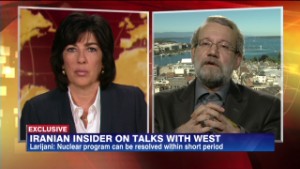 Iranian insider on talks with the West
Iranian insider on talks with the West
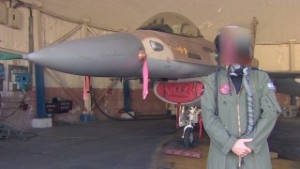 Israeli Air Force pilots warn Iran
Israeli Air Force pilots warn Iran
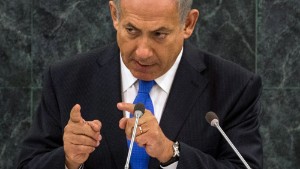 Netanyahu still skeptical of Iran
Netanyahu still skeptical of Iran
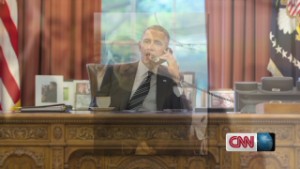 15-minute call 34 years in the making
15-minute call 34 years in the making
During a visit to the U.N. General Assembly in September, Rouhani’s diplomatic approach raised hopes in the West of a thaw in relations with Tehran and progress in negotiations on its nuclear program.
Rouhani’s visit culminated in a phone call with President Barack Obama and a meeting between Secretary of State John Kerry and Iranian Foreign Minister Javad Zarif.
Iran nuclear talks are key topic as Obama, Netanyahu meet
It was the first such high-level contact between the two sworn enemies since Iran’s 1979 revolution, which sent relations between the two into a deep freeze.
Many in the West fear Iran is pursuing the development of a nuclear bomb, but Iran has always maintained that it is developing nuclear energy capabilities for peaceful purposes only.
Israel: Don’t relax sanctions too early
Israel’s Security Cabinet put out a statement Tuesday urging the international community not to ease too soon the painful sanctions that have put Iran’s rulers under pressure to return to negotiations.
“Sanctions must not be eased when they are so close to achieving their intended purpose,” the statement said.
Iran’s president: We’re open to nuclear talks, but don’t make threats
“Now is an opportune moment to reach a genuine diplomatic solution that peacefully ends Iran’s nuclear weapons program. However, this opportunity can be realized only if the international community continues to put pressure on Iran and does not ease the sanctions prematurely.
“It would be an historic mistake not to take full advantage of the sanctions, by making concessions before ensuring the dismantling of Iran’s nuclear weapons program.”
Ofir Gendelman, a spokesman for Israeli Prime Minister Benjamin Netanyahu, repeated the warning via Twitter Tuesday morning.
“Israel does not oppose Iran having peaceful nuclear energy. This does not require uranium enrichment or plutonium. Iran’s nukes prog does,” he said.
Could Revolutionary Guards sabotage Iran-U.S. thaw?
A country that “regularly deceives the international community” does not have a “right to enrich” as Iran claims, Gendelman said.
A senior Obama administration official told reporters in Geneva that the Obama administration would be willing to consider quick relief on sanctions “targeted in proportion” to what Iran puts on the table should it be prepared to curtail the pace and scope of its uranium enrichment program, offer steps to improve transparency of its nuclear program, and address concerns over its stockpile of enriched uranium.
Larijani: ‘We are ready’
Ali Larijani, Iran’s powerful parliamentary speaker and a close associate of the nation’s supreme leader, Ayatollah Sayyed Ali Khamenei, said last week that Iran is serious about resolving the dispute over its nuclear program.
It is keen to resolve the issue “in a short period of time,” Larijani told CNN’s Christiane Amanpour in an exclusive interview from Geneva. “From Iran’s side, I can say that we are ready,” he said.
Rouhani: Nuclear weapons have no place in Iran’s security
“If the Americans and other countries say that Iran should not develop a nuclear bomb or should not move towards that, then we can clearly show and prove that. We have no such intention. So it can be resolved in a very short period of time.”
Nonetheless, Larijani said, the West must accept Iran’s right to enrich nuclear fuel for civilian purposes, as allowed under the Treaty on the Non-Proliferation of Nuclear Weapons (NPT), to which Iran is a signatory.
Critics have expressed suspicions over that enrichment, fearing Iran may secretly be transforming nuclear fuel into atomic bomb-grade materials.
Building trust
Some believe that Iran’s recent apparent willingness to negotiate seriously over its nuclear program is a result of the effect of crippling sanctions on its economy.
Shortly after this year’s U.N. General Assembly ended, a U.S. State Department official said the United States would be prepared to consider relaxing certain sanctions on Iran if it engaged in confidence-building steps to prove its sincerity to negotiate over its nuclear program.
But this will take time and the building of trust.
Under Secretary of State Wendy Sherman, who is in Geneva, stressed that the entire sanctions regime targeting Iran would not be lifted “any time soon” unless the array of concerns about Iran’s nuclear program was fully addressed.
CNN’s Andrew Carey reported from Geneva, Elise Labott from Washington and Laura Smith-Spark wrote and reported from London. CNN’s Michael Schwartz contributed to this report.
View post:
Iran nuclear talks open with hope
The post Iran nuclear talks open with hope appeared first on Arne Ruhnau News.
via Arne Ruhnau News http://arneruhnau.com/iran-nuclear-talks-open-with-hope/
No comments:
Post a Comment